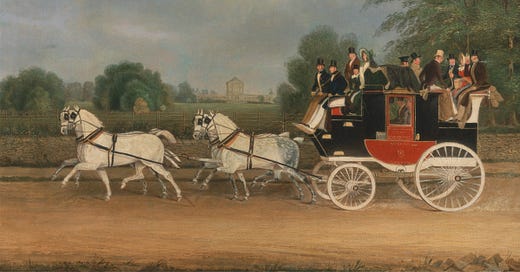
I recently read a passage from Kierkegaard’s Repetition 1 which put me painfully in mind of the discomforts of long-haul flights travelling in economy class – or “coach”.
The learned disagree on which seat is the most comfortable in a stagecoach; in my Ansicht [opinion], they are all wretched, the whole lot. Last time I had an end seat forward inside the carriage (some regard this as the big prize), and after thirty-six hours was so jounced together with those sitting next to me that when I arrived in Hamburg, I had lost not only my mind but my legs as well.
In my career I’ve taken more long-haul flights than I can count. If I’ve yet to lose my legs (as in the exaggeration of Kierkegaard’s hero), I’ve come close to losing my mind.
The first such flight for me was from London to Quito in 1988. The last – but it is unlikely really to be the last, just the latest – from London to Tokyo earlier this year.
If after my arrival in Quito I felt for a few days like I’d landed on the moon, that may have had something to do with the altitude of the city – 2,800 metres (a little over 9,000 feet). It took a couple of weeks to acclimatise.
But the main issues I have when I travel long haul are similar; the elements are repeated, but with different degrees of emphasis: 12-14 hours of turbulence, enforced proximity with others, poor food, and poor air.
I arrive drained, dishevelled and dehydrated. Add in the jet lag and disruption to sleep, and the impact lasts for days. It’s like voluntarily giving myself some kind of malady.
After each journey, I say to myself, “never again.”
And then it’s time to repeat the cycle again.
Somewhere, David Bowie had a line about “always crashing in the same car.” When it comes to long-haul travel, my life can feel like that.
Keep reading with a 7-day free trial
Subscribe to English Republic of Letters to keep reading this post and get 7 days of free access to the full post archives.




